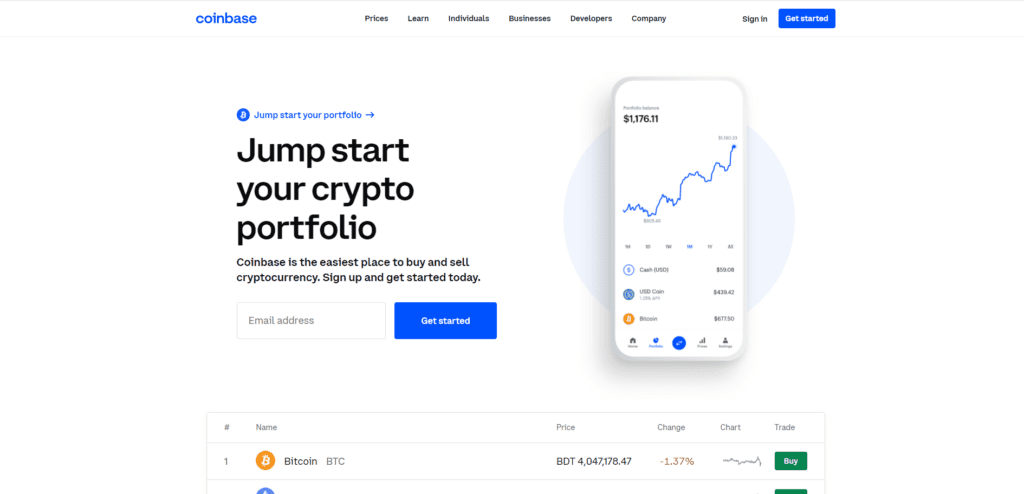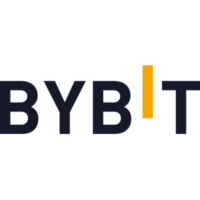Easiest place to buy and sell cryptocurrency
History of Coinbase Exchange
Coinbase is currently one of the largest cryptocurrency exchanges in the world and was founded by Brian Armstrong and Fred Ehrsam. It is headquartered in the US and operates from the San Francisco region. It started offering services in 2012 and serves about 73 million verified users currently.
Coinbase has sought licenses in the US and in many jurisdictions in Asia and Europe.
The exchange is accessible via an application and through its site.

Who owns Coinbase?
Brian Armstrong is the co-founder and CEO currently.
Regulations of Coinbase
Coinbse has sought licenses for operation in many jurisdictions and is a reputed and regulated cryptocurrency exchange. It offers services in 13 countries in Africa, 21 countries in Asia, 39 countries in Europe, 8 countries in South America, 18 countries in North America, and New Zealand in Oceania.
Coinbase is regulated under the UK's Financial Conduct Authority (FCA) and is also licensed to operate in many US states. Coinbase is regulated under FinCEN in the USA.
Coinbase may limit access to some or all features based on the country’s jurisdiction and prevailing regulations.
What Cryptocurrencies are available on Coinbase?
Coinbase supports trading in major cryptocurrencies with 132 coins supported currently. It offers trading with cryptocurrencies paired with other popular altcoins and fiat currencies such as USDT, UST, BTC, ETH, XRP, DOGE, EURO, GBP, UTK, USDC, AVAX, COMP, BAL, ENJ, LTC, LRC, MKR, NU, NTVL.
Coinbase also supports the stablecoin USD Coin (USDC) that is redeemable on a 1:1 basis for US dollars and is backed by dollar denominated assets held in segregated accounts with US-regulated financial institutions. The stable coin USDC is the result of a collaboration between Coinbase and Circle. Coinbase only supports the ERC-20 version of USDC.
What payment methods are available on Coinbase
The Coinbase exchange supports many payment methods including credit/debit cards, bank transfers, and third-party payment processors.
Credit/Debit cards: Coinbase allows its users to deposit fiat currencies through debit/credit cards. Both Visa and Master cards are supported on the platform. Coinbase supports major fiat currencies including the British Pound, Euro, and the US Dollar. A currency conversion charge may be levied if the transaction currency is different from those supported by the exchange.
Bank Transfer: Coinbase supports direct bank transfers in many countries and for the currencies described above. SEPA transfers are supported in Europe. Deposits with Apple Pay are supported but withdrawals are not supported currently. In the US, Google Pay is also supported.
Third-Party payment processors: The Coinbase exchange also supports some third-party payment processors such as PayPal, Apple Pay, and Google Pay through which the users can also deposit fiat balance into their Coinbase account for purchasing cryptocurrencies.
Investment instruments
Coinbase offers a range of products and caters to a diverse set of clients through its multiple offerings. These services are described below.
Coinbase Card: This service is available only for US customers. The Coinbase card can be used wherever Visa cards are accepted and also allows users to earn attractive rewards while spending crypto through their Coinbase cards. It allows users to spend USDC or US dollars.
Coinbase Pro Account: Coinbase provides the ability to open corporate accounts for high-net-worth individuals and companies. A Coinbase Pro Account provides a dedicated Digital Currency Wallet for each currency offered on Coinbase Pro; a dedicated E-Money Wallet enables you to store E-Money and associated user tools such as access to APIs with the power to deploy trading bots.
Coinbase also offers a Private Client account service for HNI investors, trusts, and families. The Coinbase Private Client service provides a desk service and a dedicated account manager.
Coinbase Learn and Earn: It is the native educational resource for all things crypto. The Coinbase academy publishes research-driven content about cryptocurrencies, NFT, and the blockchain universe. It serves to help the user understand various altcoins and blockchain technology. Users can watch educational videos and earn small amounts of crypto in return.
Coinbase Ventures: Coinbase offers advisory, fiduciary and institutional support for businesses looking to offer interesting products in the blockchain space. It supports upcoming technologies and provides them with the necessary funding and guidance.
Coinbase Custody: Coinbase offers custodial services for institutional clients including the ability for staking and governance. It is regulated by the New York Department of Financial Services (NYDFS).
Cloud And Broker services: Coinbase also provides cloud and broker services with technical support for institutions and enterprises seeking to leverage and benefit from crypto and blockchain solutions.
Coinbase NFT Marketplace: Upcoming NFT marketplace powered by Coinbase where users can mint and earn from their NFTs. It is being built to provide support to artists, collectors, and users on a single platform and will be launched soon.
Staking on Exchange
Coinbase allows users to stake 4 cryptocurrencies: Alogorand (ALGO), COSMOS (ATOM) Ethereum (ETH), and Tezos (XTZ). Staking can help users to earn additional benefits. Staking on the Coinbase exchange provides a fixed annualized yield. Coinbase offers a flexible lock-in period and the user can choose the duration of staking. However, the user must stake for a minimum period of one day to remain eligible for the staking rewards.
How to open an account on Coinbase
You will need to complete the Know Your Customer (KYC) procedure to open an account on Coinbase. The steps involved in opening an account are described below.
Steps to open an account on Coinbase:
1. Go to the Coinbase site and click on the Register button.
2. Then select your country of residence and proceed to the registration interface. Here, you will need to provide your email ID/phone number and a password that will be used to login into the newly created account.
3. Click on the agree to terms and conditions button and wait for the verification mail or message.
4. Clicking on the verification tab will take you to your new account. You will need to provide documentation such as a driving license, passport, or other government-issued IDs to confirm your identity and address. A utility bill and national ID may also be accepted in some cases. This process is known as the KYC regulation and it is in place to prevent the risk of fraud and to ensure that the site is safe for all users.
5. Once this additional step is completed, Coinbase will activate your account and you can deposit funds to start trading.
Customer support of Coinbase
The customer support of Coinbase consists of well-trained professionals who will help you out if you get stuck or need some help with an issue. The support section is well doxxed with a range of FAQs that could solve your queries. Coinbase chat support can also be contacted in case a user needs extra help. Users can also submit a request and get the desired support via email.
Security of Coinbase
Coinbase invests in security and has built a solid reputation among its users. The majority of client's funds are stored securely in an offline environment. Users can also secure their accounts through 2FA and by various other measures such as requiring an SMS passcode sent to their mobile phone for every login instance. Email and app-based authentication is also supported by Coinbase. Coinbase also provides FDIC insurance (currently $250,000 per individual) for US customers.
Coinbase also suspends and locks accounts in case the unusual activity is detected.









